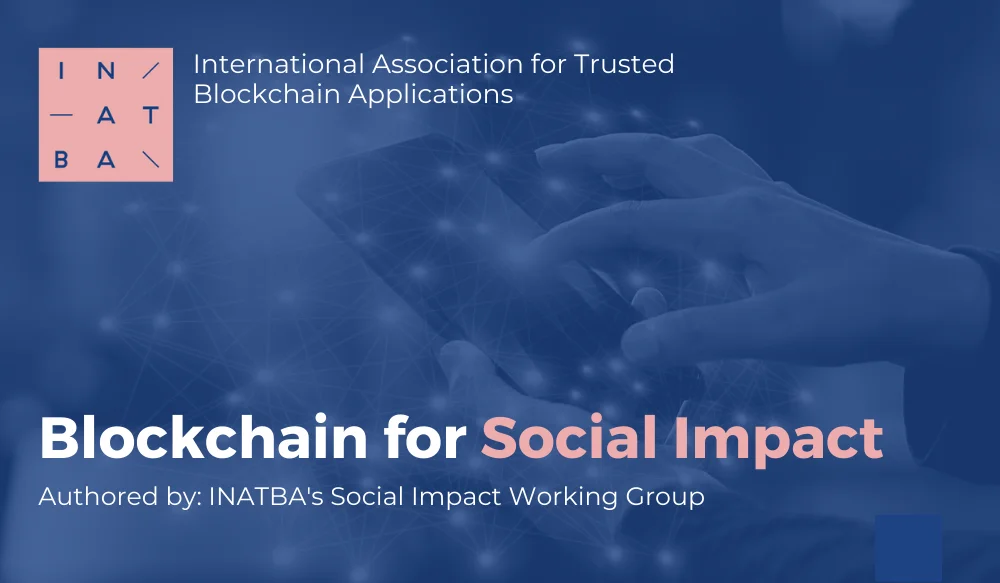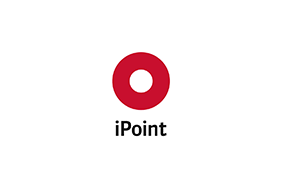Blockchain for Social Impact: New Report by Blockchain Association INATBA
iPoint is co-author

REUTLINGEN, Germany, September 20, 2021 /3BL Media/ - The International Association for Trusted Blockchain Applications’ (INATBA) Social Impact Working Group (SIWG) recently published a report titled “Blockchain for Social Impact”. The report, co-authored by founding member and software provider iPoint-systems, provides insights into the role of the UN Sustainable Development Goals (SDGs) for blockchain-based social impact and announces the launch of social impact framework development.
INATBA is the leading convener in the global blockchain ecosystem, with 170+ members dedicated to promoting global adoption of blockchain and Distributed Ledger Technologies (DLT) by bridging the gap between policymakers and industry stakeholders for mutually beneficial conversations. The SIWG – co-chaired by iPoint CEO and founder Joerg Walden and Mariana de la Roche from IOTA Foundation – is one of INATBA’s 15 working groups. It focuses on leveraging member expertise to understand and highlight the potential of blockchain/DLT to tackle social and environmental issues such as climate change, poverty, inequality, food waste, corruption, and other areas addressed by the SDGs.
The newly published report, co-authored by iPoint’s Joerg Walden and Maroye Marinkovic and based on a survey conducted by the SIWG, aims to better understand the objectives, challenges, and potential impact of blockchain and other DLT for social impact projects. Representatives from approximately 70 projects participated in the survey, leading the following key findings: SDGs were considered throughout the development of several projects, and most projects measure their impact on the SDGs and a majority of respondents face challenges regarding standardization and interoperability as well as access to funding. Respondents expressed the need for a global audit/standard for the blockchain community that will allow for more meaningful evaluation of progress toward social impact. In response, INATBA will be launching a workstream focused on the development of such a framework based on insights from members as well as external stakeholders including academics, social impact specialists and project developers.
“As the report conducted by the SIWG shows, blockchain for social impact offers numerous exciting applications that have the possibility to make a meaningful difference in society. INATBA is proud to lead the development of a framework to measure impact for these projects, helping contribute toward a more interoperable and impactful ecosystem,” remarked Marc Taverner, Executive Director of INATBA.
iPoint CEO and Social Impact Working Group co-chair Joerg Walden noted, “In order to secure a more sustainable world for future generations we need a massive change in mindset and transparency. These changes can only be realized with strong global partnerships and cooperation, and a full trust in data. The same is true for blockchain and DLT – which are clearly collaborative technologies. This report shows that we need the collaboration, full support, and openness of all actors if we are to realize SDGs with the help of powerful tools and technologies such as DLT.”
You can access the report here: https://inatba.org/reports/blockchain-for-social-impact/.
Press contact:
Dr. Katie Boehme
Director People & Communications
iPoint-systems gmbh
+49.7121.14489-60
circular@ipoint-systems.de
About iPoint
iPoint is a leading provider of software and services for environmental and social product compliance, process compliance, and sustainability with a user base of more than 60,000 companies. Since its founding in 2001, iPoint has been constantly expanding its portfolio to realize its vision of building an integrated digital platform for the Circular Economy. Further information: www.ipoint-systems.com
About INATBA
INATBA is the leading convener in the global blockchain ecosystem, offering developers, companies, and users of blockchain/distributed ledger technology a forum to interact with regulators and policymakers and bring blockchain technology to its next stage. The mission of INATBA is to develop transparent and inclusive governance and cooperation models for blockchain applications, to inform policy and regulatory measures that may contribute to harnessing the many opportunities of blockchain through a close dialogue with policy-makers and regulators, and promote regulatory convergence that drives potential impacts for society and the economy from these technologies. To learn more, visit www.inatba.org.

